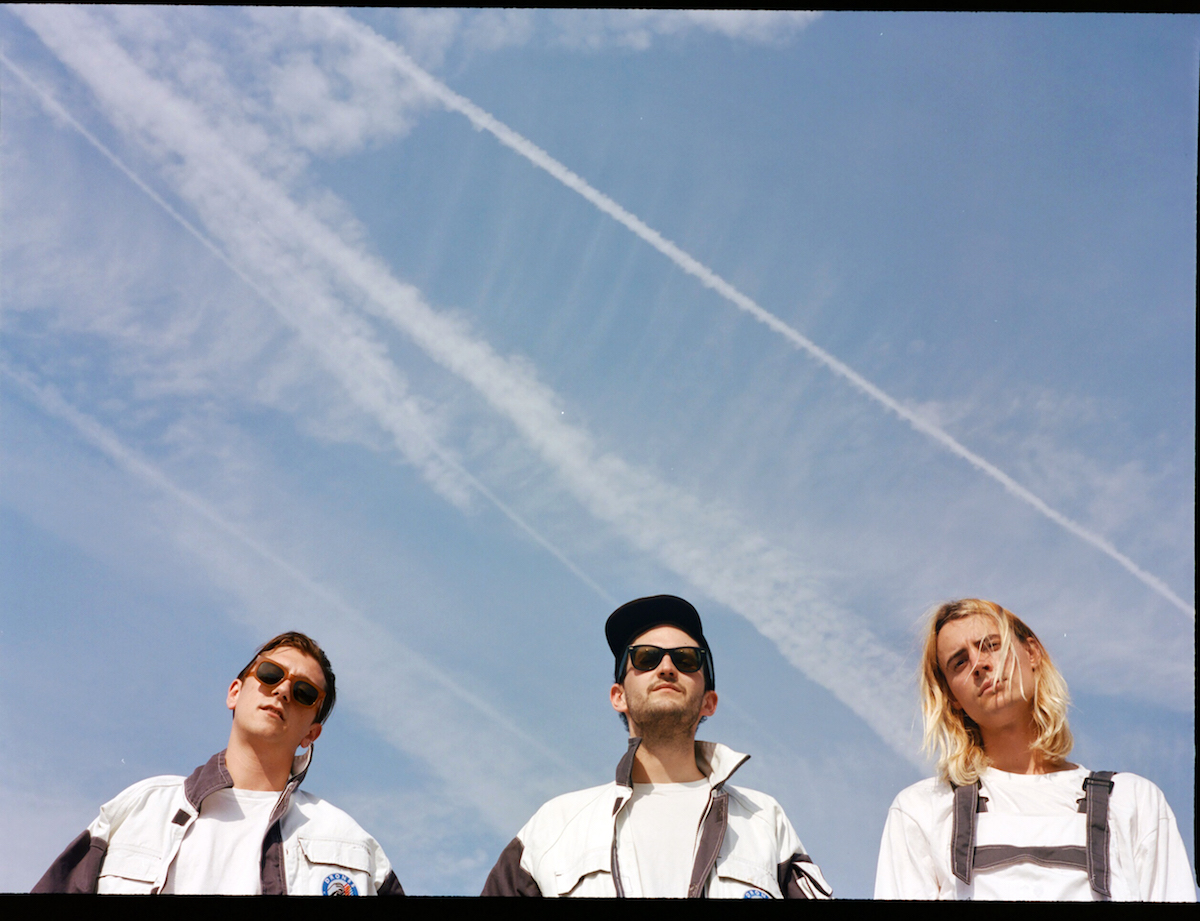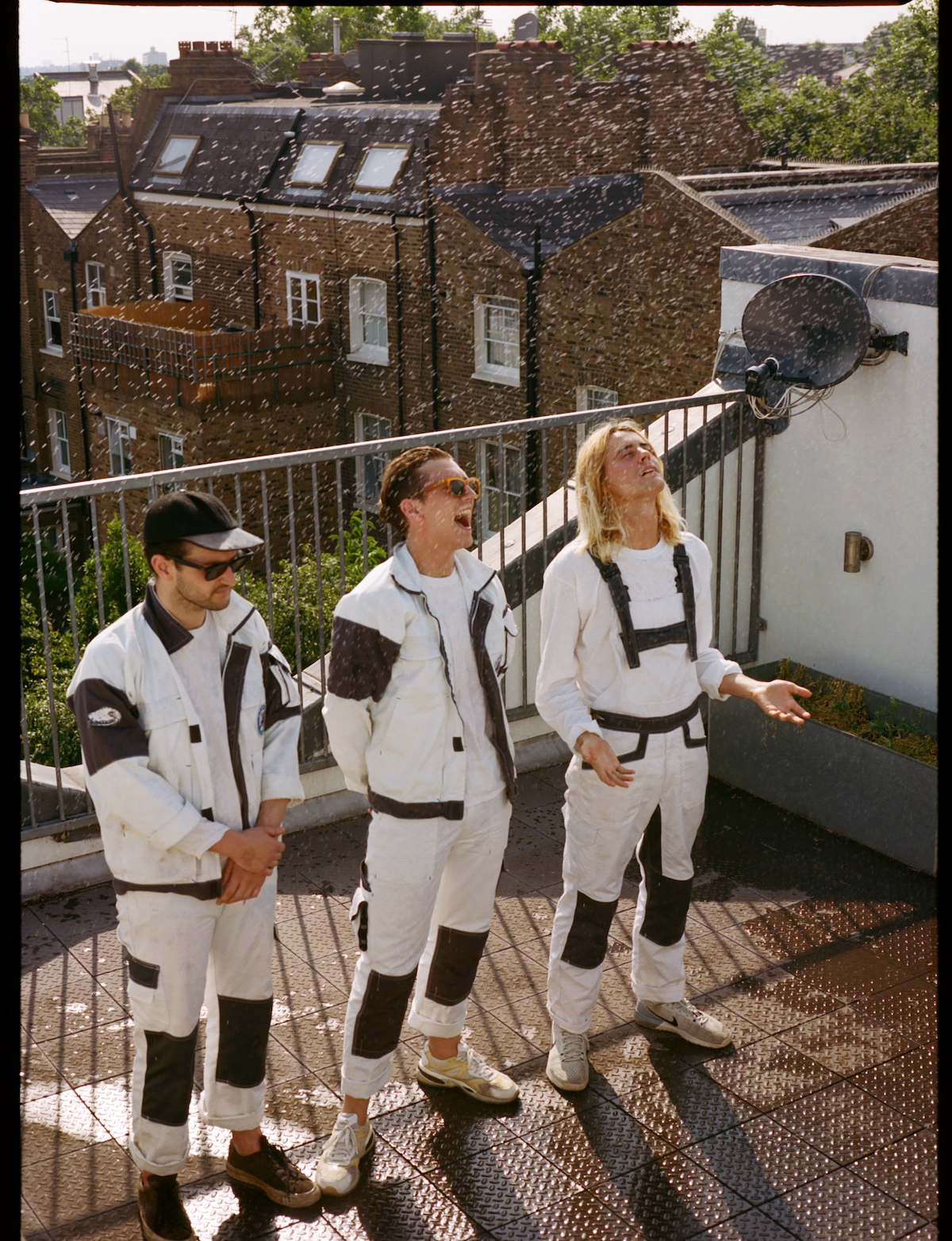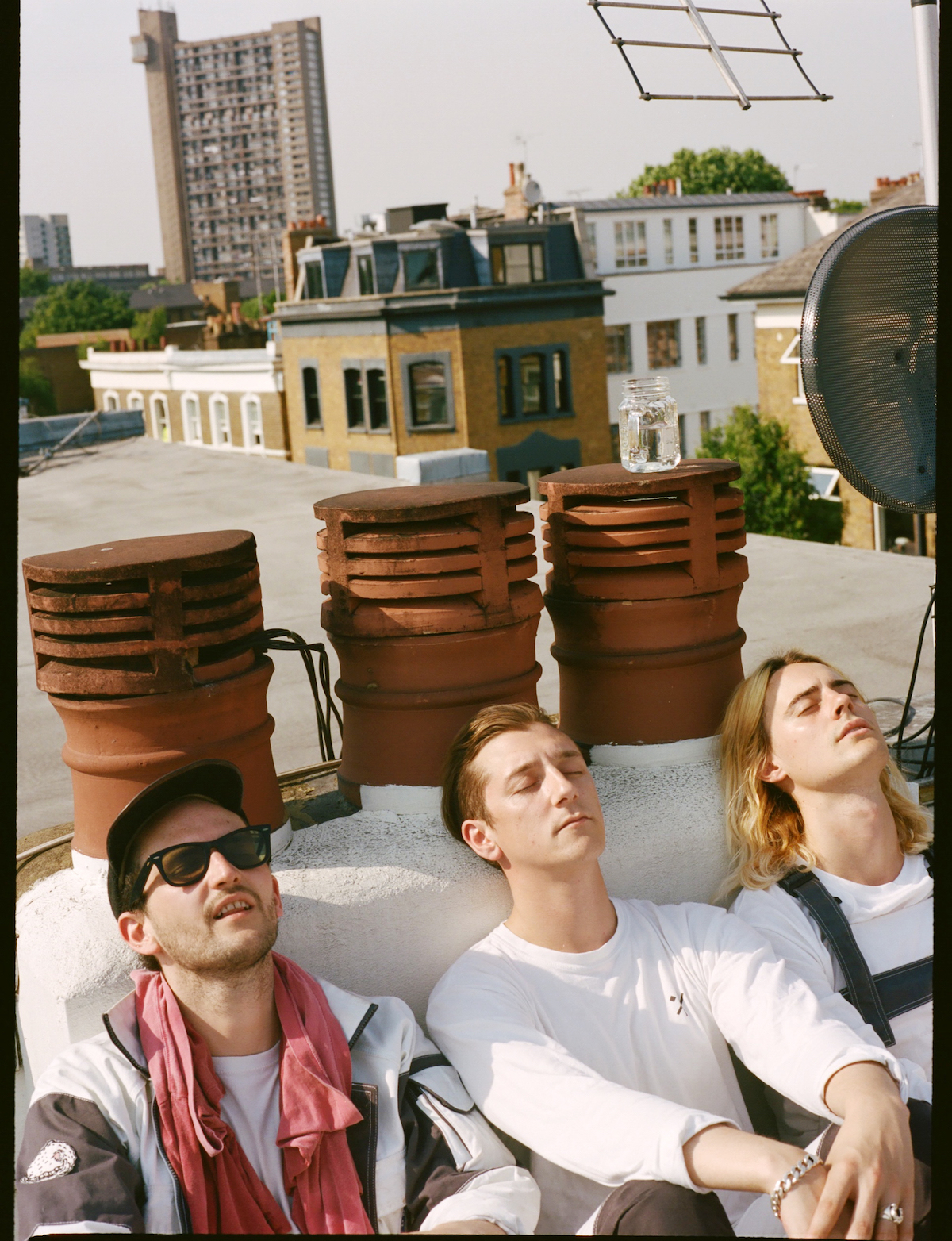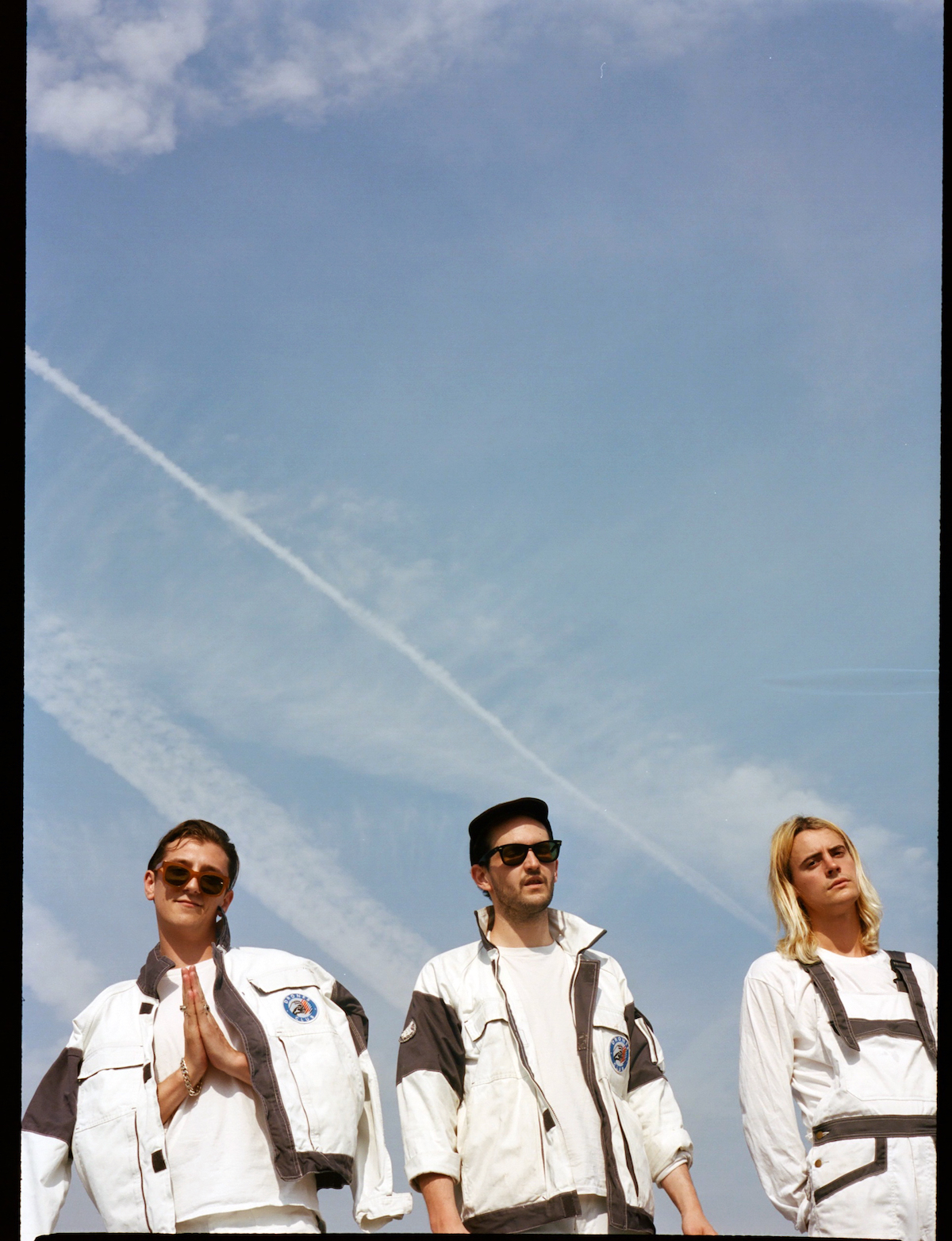Out of the Wilderness: An interview with Drones Club
Music — 24.07.17
Words: Aaron Powell
Photography: Lily Bertrand-Webb
All clothing is property of Drones Club
Special thanks to Kodak

And out of the wilderness, they emerged. Garbed in white, faceless, without emotion or feeling, united by a single idea; to reconnect with each other and Zwith the world around them. And into the swamp they came, stumbling upon the White Crocodile who implored them to sing more tunefully, to sing to the people and to sing to each other. And to the city they went, casting aside their masks, embracing their humanity and the beauty therein.
This is the story of Drones Club, a collective of individuals operating as one single mind in one single body. These are their voices, and this is their message.

What catalysed the formation of Drones Club and what inspired you to come together?
We had Drones Club as an idea for a number of years. We used to have quite extensive conversations about what needed to be done. It was kind of a benevolent analysis of the world and how everything was going; the state of the world, the state of the music industry, the state of it all and working out the star shaped hole for a star shaped peg that kind of existed there, then creating something that could live within that.
You deal with a range of philosophical, political and social ideas, for example, Kiki’s House of Tea and Chelsea Manning. Why did you think it was important to highlight those issues?
We don’t necessarily see them as political or philosophical issues they are more just issues for life. We believe that it is incredibly important for any music and any art to respond to the world that it exists in and to engage with that on a deeper level because we all live here in a time together and in a society full of people. Chelsea Manning is almost a saint within our mythology because she represents so much of the how Drones Club message can translate to the world in a deeply impactful way and actually change the course of history as she did. Working with, for example, The Kiki House of Tea the pure level of self-expression and freedom within that was kind of representative of us far better than we ever could, and that is why we wanted to showcase them in all their resplendent glory. I guess we don’t see them as political or philosophical issues they are just necessary precursors to what music should be and what music should respond to. Everyone has heard enough of songs about nothing. Art should not be about one person’s specific experiences it should be for everyone, and it should be for all whether we achieve that we want to push the marker forward and raise the mercury.
Do you think a musical outfit can catalyse change? Is it not arrogant to assume you can create a change in social outlook?
We are not necessarily expecting to inspire social change but by taking part in society and producing words and interacting with people you are entering into human culture, and everything that you do should be informed and inflamed by a sense of forwarding motion. You push things forward, and that will perpetuate other culture to be similar because the things you hear will inspire the things you do and the things you see. It’s a feedback loop, and so that is the most honest and natural thing to do. Without expectation but with hope push things back into that feedback loop and hope that they will come back round.
You make predominantly pop music. Are you saying pop music in its essence can be used to change people’s perceptions of things and feed into the idea you have just mentioned?
Absolutely. It is less about the output and more about the intention. We don’t see them as individual pop songs that you put up guarded by their file name on the computer. They are all part of a greater river of work that we have produced, and then that river goes and joins the great dirty sea of human culture which everyone has to swim in because we are born there. That’s what we live and breathe through our sensation gills.
So there is a thematic link through all of the output then?
Yeah, it all comes through this room. This is where we understand each other, and we make plans. Everything has its markers and its indicators towards other things, there are repeating motifs, and it all comes together under the all encompassing philosophy of reconnection.

From seeing you live and listening to some of your earlier tracks, there seems to be this odd, fervent religious overtone. Would you say you are poking fun at the absurdity of organised religion or are you embracing the all-consuming dedication to an idea?
I think it can sit between both. Again, it comes back to that idea of it not necessarily being about just one part but about the larger picture all flowing into one. You can take from it what you will and respond to it. You are saying that religion is one of the stronger points so that is the way you are reading into it but another individual might read into some other motif that we have explored.
That emphasis on congregation is the most important idea then?
Reconnection. It is one of the deeper points. There is a great deal of sincerity in how we imitate the celebratory nature of a church going and in the same way earlier on we took on military styling, and there was a sense of togetherness. There are elements from these organisations that we see in life that we mirror but not necessarily in a satirical or celebratory way. These are just facts and figures that we deal with, and ultimately they are all examples of how people come together, live together and do things together. I guess we are trying to find the more subtle idiosyncrasies in each of those organisations and explore them as facets of a larger topic.
Do you have any examples of organisations that have inspired you in that way? From my own view, Scientology seems to play a big part in the project.
Just out of interest we went down to the Scientology Centre when Drones Club first started. Graphically and the way they channel information definitely inspired us. The psychological hyper-overload of information and the way they feed it to you in a reflection of how we are feed information anyway. The chairs were bolted 30 cm’s away from the telly, and they take you around from station to station and sit you in front on the television. The way people are consuming digital media now; they are playing off that. Their religion is feeding off social media, and that is the route they are going down. It was just an absurd extension of how we are taught to consume culture these days. We didn’t want Drones Club to be about us. We are just three highlighters. Three highlighters from Tottenham.
It’s interesting that you mention you didn’t want Drones Club to be about you. I read an interview where you said you believe in ‘the old idea of not wanting ego to get in the way”. So, you’ve just mentioned you did not want the project to be about yourselves but more recently you three have shed the shrouds of mystery while the other drones have kept the masks on. I put to you are some drones more equal than others?
From the very beginning, we wanted it to be a slow opening of a large set of double doors. This is the kind of gradual humanisation of something that was quite shocking and quite militant at first glance. We have gradually tried to open it up and make people realise it is not alien and it is not a cuckoo in the nest, but it is everyone. The whole idea around drone and anonymity and making people realise we are all the same can be slightly jarring. We wanted to make everything a bit more friendly, to humanise it. I think you will gradually see this summer and moving on to the next year the project humanising more. More flesh.
That sort of leads to my next question. You’ve had this steady movement to arguably a more mainstream pop sound that has become more digestive especially in your latest EP. Is the main reason for that change in sound the idea of humanising Drones Club?
It has definitely been part of the plan all along. We have definitely achieved what we wanted with White Crocodile. One way to look at it would be; we started out as quite an isolated band in the wilderness, and we moved more towards people and urbanisation. The White Crocodile EP is the sound of cars going past in that urbanisation. We want people to ultimately take our message deeper into their hearts.
Is there a story behind White Crocodile?
In between the wilderness and the urbanisation we went on a sort of revelatory trip to the swamp where the White Crocodile lives who told us to sing more tunefully and to sing more to people and that’s the story behind it. If you can imagine us moving from obscurity into civilisation, we would have to pass through the detritus of human existence. So, that is what we have done, we have travelled from that obscure place, and now we are moving into something more human.

I don’t think I should ask this question after you have spoken to passionately about the project but there have been points, especially visually, where I wonder how seriously you take Drones Club. Is the project just a satirisation of artists trying to create change or is something much deeper than that?
It is much deeper than that. It is not a satire it is very sincere. If you look at the language we are using with regards to religion, politics and the military, humour is a massive part of how people do things, and it is really important that we use that and recognise that. Humour is joy and laughter, and it is a vital part of what we do. As a part of the narrative storytelling, it can be used as a tool to disarm an audience and can carry a deeper message for us. Imagine if everything was grinding electro all the time? It would be fucking awful.
Do you find when there is this constant flux in what you are perpetuation that your audience doesn’t know where to stand?
That is an issue. We are working on it. If anything, the way people consume culture these days is very junk food. People are fixated on things for about fifteen seconds. The mimetic nature of culture is so instant that maybe this is one of the motifs that we have explored, that we will create content that is quickly moving.
Is that why your output is quite a lot larger than most of your contemporaries?
Yes. There are an odd ritualised six months of bands growing their hair in a studio. You see pictures of their hair getting longer, and they get more and more serious. You see the odd Instagram picture with a member of the band holding a fader. There’s a social media blackout and then suddenly “here comes the album!”. It shouldn’t be like that because that is not how people consume things these days. It’s odd, dogmatic and weirdly ritualised and it should be freer. It should be just a big tasty free exchange. I think that is why we have taken to the EP formats because it’s delivering for us.
When you say “free exchange” I would assume you would have a slight issue not being paid?
Yeah, it would be a problem. If you can’t afford our music, steal it. You can quote us on that.
Having seen you in some of your more formative musical projects, do you think there is a natural successor to the music guitar bands made back in the day?
We take issue with associating guitars and pianos with authenticity. They do not necessarily denote honesty. Sometimes medium and message get confused, and people get hung up on something sounding a bit like Springsteen, so they think it is going to sound more real than something that sounds like Rick Ross. It is a conversation, and great debate about what is going to happen next and things should be a reaction against one another.
Finally, what are some of the qualities a drone embodies and how do you become one?
Being a drone is part of being something greater than yourself. You kind of shed the idea of ego, and you become one part of many. What is under the mask does not matter, what matters is you are symbolising community and positive interaction with your environment so that kind of mentality can be applied in multiple different ways. One of them is wearing a mask, and the other could be just putting on a patch. It doesn’t have to be merchandise it can be about how you interact with people around you. It is a deeper mentality as opposed to an exclusive members club. It is something greater than that.
Follow Drones Club via Instagram @drones_club and check out their latest album, White Crocodile, available to stream via SoundCloud.